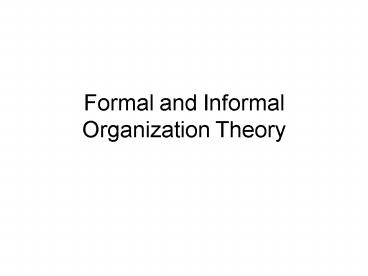Formal and Informal Organization Theory PowerPoint PPT Presentation
1 / 10
Title: Formal and Informal Organization Theory
1
Formal and Informal Organization Theory
2
Meaning of Org theory
- A way of predicting and controlling relationships
in and around organizations. - Examine organization as its own entity
- unit of analysis is an org. itself
- It looks at organization as a whole and to see
the behavior of organizations in terms of its
structure, goal setting, and organizational
change - It seeks to explain how groups and individuals
behave in differing organizational arrangements
3
Classic Organization Theory
- The first theory of its kind
- Emerged during industrial revolution
- It was rooted in the professions of mechanical
engineering, industrial engineering, and
economics - Heavily influenced by the context of industrial
revolution with the focus on efficiency and
productivity
4
Tenets of Classical Organization Theory
- Organizations exist to accomplish
production-related and econ goals - One best way to organize for production and that
way can be found through systematic, scientific
inquiry - Production is maximized through specialization
and division of labor - People and orgs act in accordance with Rational
economic principles
5
Influential Theorists
- Adam Smith the pin factory
- SPeicalziation
- Division of labor
- Frederick W. Taylor
- Father of scientific management
- One best way to accomplish any tasks
- Henri Fayol
- Principles of organization
- Technical, security, finance, managerial,
accounting, and commercial - Managerial is the most important aspect of
organizations - Gulick POSDCORB
6
Scientific Management
- Replacing traditional rule-of-thumb with
scientific methods - There is one best way to accomplish any tasks
- Managers are responsible for discovering these
principles. - The scientific study of the selection and
sequential development of workers - The emphasis is to ensure optimal outcomes or
workers. - Obtaining the cooperation of workers to ensure
full application of scientific principles - Apply scientific principles to workers
7
Neoclassical Organization Theory
- Criticisms of Classic Theory of Org
- The humanness of organizational members
- Ignore needs of employees
- Coordination needs among administrative units
- Internal-external organizational relations
- Static environment
- Organizational decision process
- Assume rational decision making within an
organization
8
Influential Theorists
- Herbert Simon Bounded Rationality
- Humans are bounded in their decisions
- Limited by their cognitive ability, time,
resources, and money to make comprehensive
decisions - Satisfice rather than optimal results
- Phillip Selznik
- Systems theory
- Peter Senge
- Organizational learning
9
Mechanistic Model of Organization
- Mechanistic
- Traditional pattern of hierarchy
- Reliance on formal rules and regulations
- Vertical communications
- Structured decision making is possible
- Specialization of functional tasks
- Closed system of organization
- Static environment assumption
10
Organic Model of an Organization
- Environment changes rapidly and not static.
- A form of organization is less rigid and more
participative in nature. - Rely on workers to define and redefine their
positions - The realistic nature of individual task is seen
as set by the total situation of the concern. - Adaptability to change outside of an
organization. - A horizontal gt vertical direction of
communication resembling consultation rather than
command

